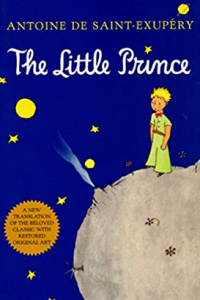December 13, 2018
Jill U. Adams is a health journalist and an associate editor at HealthNewsReview.org. She tweets as @juadams.
 I read a lot of health news, as part of my daily search of eligible news stories for our team to review. So much so that I notice health claims in all kinds of unusual places. Even in fiction.
I read a lot of health news, as part of my daily search of eligible news stories for our team to review. So much so that I notice health claims in all kinds of unusual places. Even in fiction.
My book club recently read “The Little Prince,” the classic story written by French pilot Antoine de Saint-Exupery in 1943.
Here’s the key excerpt (Chapter XXIII):
“Good morning,” said the little prince.
“Good morning,” said the salesclerk. This was a salesclerk who sold pills invented to quench thirst. Swallow one a week and you no longer feel any need to drink.
“Why do you sell these pills?”
“They save so much time,” the salesclerk said. “Experts have calculated that you can save fifty-three minutes a week.”
“And what do you do with those fifty-three minutes?”
“Whatever you like.”
“If I had fifty-three minutes to spend as I liked,” the little prince said to himself, “I’d walk very slowly toward a water fountain….”
You see? There’s an intervention — pills — and a claim of benefit — quenching thirst. If such a claim appeared in a news story, I would forward the article to the HealthNewsReview.org team. It’s precisely the kind of thing we would put through our systematic review process, in which journalists and independent experts evaluate how well the story meets each of our 10 criteria.
In the excerpt above, the little prince serves as the consumer or patient to whom the intervention is marketed. However, our prince is unmoved by the purported benefit. He recognizes that even if the pill works as it is marketed, it offers him no personal advantage. He’d rather drink from a water fountain. Also, he has no need to save fifty-three minutes from his week.
I can’t help but to be charmed by his skepticism.
Now imagine a little princess…
Let’s imagine another interplanetary traveler, a little princess, who is tempted to try the thirst-quenching pill. I sincerely hope she asks a few questions of the sales clerk so that she can make an informed decision.
How much do the pills cost? What’s the evidence that they work? Are there any side effects? And is the only source the very sales clerk who likely has a vested interest? Why is the ‘need to drink’ framed as a condition that needs fixing? Is this disease-mongering?
The little prince discerned an existing alternative — a slow walk to a water fountain. He knew his preference.
Perhaps our little princess will decide to try the pill. Or perhaps she will come to the same conclusion as the little prince — that a water fountain is preferable.
Either way, we believe she needs the full suite of information in order to make a good choice.

